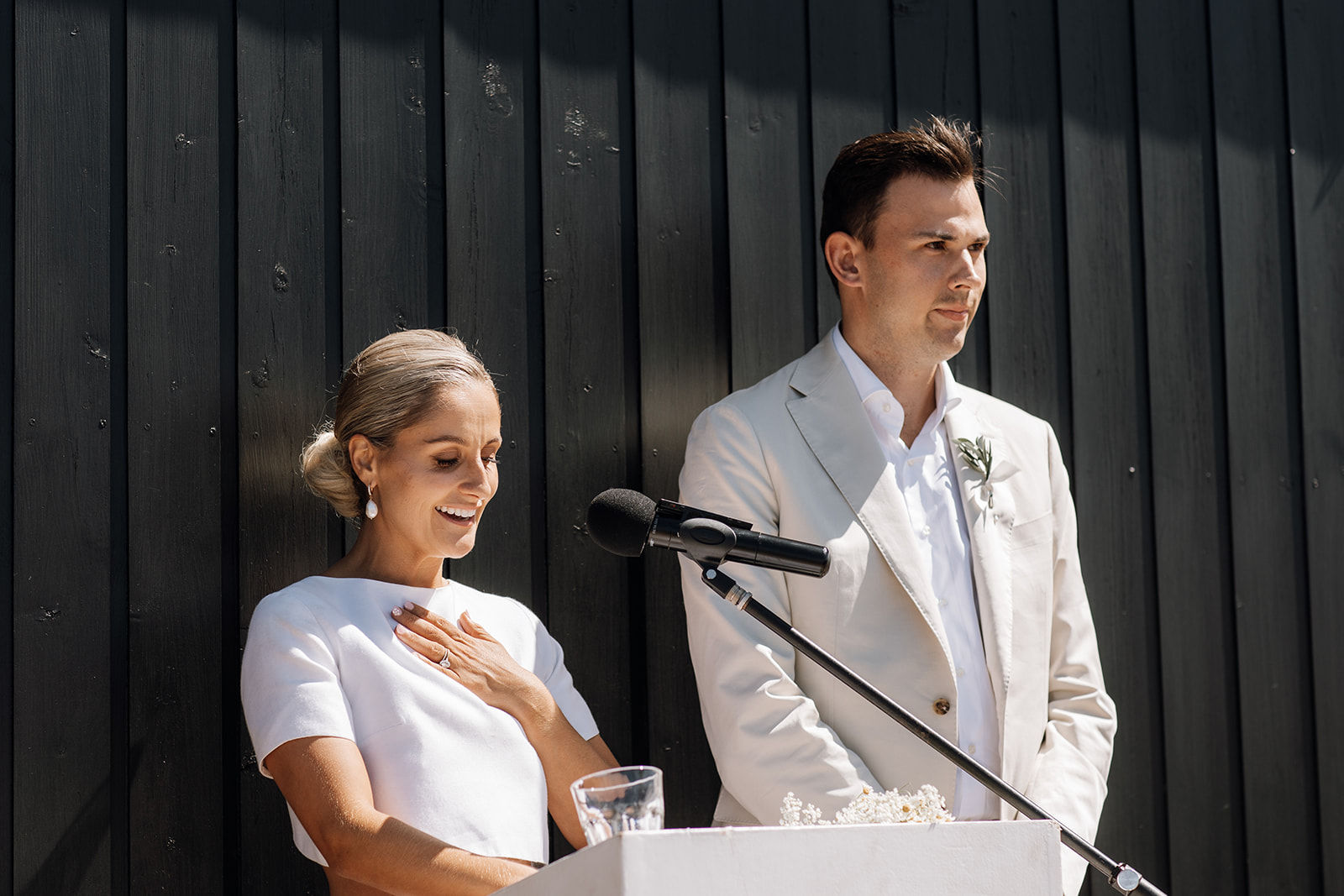Congrats, you’re engaged! Pop the champagne, say “fiancé” until it feels normal (hint: it won’t) and, well, buckle up – love is in the air, but so is the inevitable scent of stress that seems to follow engaged couples everywhere (*sigh*).
It’s a widely accepted truth, but why is that? Why is wedding planning stressful? We think this is a valid question that’s worth exploring. After all, shouldn’t your engagement be a time of pure joy?
If you’ve been pondering these same questions, you’re about to learn why matrimonial meltdowns are so common during the wedding planning process, as well as some practical strategies to cope.
Why is wedding planning stressful?
For as long as most can remember, western culture has often depicted wedding planning as a whirlwind of joy. Images are always of sentimental moments and happy tears. However, behind the Instagram-worthy wedding photos and the romantic comedies we all love, there lies a reality many engaged couples and their entourages face – wedding stress.
Here are some of the reasons stress so often goes hand-in-hand with planning a wedding.
Expectations vs. reality
With the advent of social media came a surge of idealistic images that inadvertently set the bar impossibly high. The wedding we’re told by many sources we should desire often doesn’t line up with the reality of our lives—and more crucially, our finances.
While the vast majority of players in the wedding industry do this job because they love people and creativity, the truth is you’ll be served content that is (often inadvertently) designed to lift the consumer to an aspirational space. Social media amplifies this, with a constant stream of picture-perfect weddings that appear effortlessly stylish and serene. This disparity between what is real and what is marketed can be a significant source of stress for couples as they navigate the world of wedding planning.
Time restraints
There’s a lot that goes into planning a wedding (trust us, we wrote an entire book on it). In fact, it’s a full time job for some (cue: wedding planners). In isolation, the process of planning a wedding is somewhat manageable but life doesn’t stop just because you get engaged.
If there was an option to press pause on the rest of life’s demands and focus entirely on wedding planning, stress levels amongst engaged couples would certainly plummet. The reality however, is that most are trying to juggle the process of planning a wedding alongside everything else – work, family, recreational and social commitments etc. It’s a lot and for those who struggle with time management, it can be particularly challenging.
Wedding costs
Weddings aren’t just an investment of love and time; they’re also a significant financial investment. The sheer cost of modern weddings can be shock. Couples often find themselves navigating a complex web of expenses – from catering and a venue to the photographer and entertainment.
Budgeting for a wedding is where reality sets in hard. It can take constant, conscious effort strike a balance between creating the day of your dreams and a day that won’t leave you in serious debt, often leading to stress and even conflict. There’s pressure to “have it all” (and between cars, dresses, jewellery, styling and more, there’s lots you can have), regardless of the financial outlay. This pressure can transform wedding planning into an exercise in maintaining financial solvency rather than celebrating love.
Logistical complexities
From selecting a date to finding that elusive perfect venue, logistical wrangling is a formidable foe in the world of wedding planning. Coordinating vendors to ensure they work cohesively, managing timelines, special guest considerations, transport, accommodation, back-up weather plans, access times, run-sheets… the logistical dance can feel like a crash course in elite project management.
Emotional rollercoaster
There’s so much that comes into play when planning a wedding and it can trigger a rollercoaster of feelings. One minute you’re confidently making decisions with momentum, the next you’re doubting your decision to have a wedding all together. Please know this is normal.
The thing is weddings bring so many things into focus – family dynamics, expectations, traditions, values around money and time, relationships – and they can all hit a nerve at different times.
For couples, different opinions around this stuff can quickly escalate and it’s easy to lose sight of the bigger picture. Keep this in mind and don’t fall into the trap of thinking you’re not on the same team.
Coping strategies
While wedding planning stress might be prevalent, it’s definitely not insurmountable. There are simple strategies you can use to ensure you arrive at the altar with your sanity and relationship intact. It’s all about taking control where you can and letting go when necessary. Here are some tips.
Set your wedding priorities
Not everything has to take equal priority. Sit down with your partner and figure out the things you want to give the most time, attention (and potentially, money) to and focus on those things first. Everything that comes in after that is a bonus.
Our top tip? Get crystal clear on these ASAP. They can really help be a north star for the rest of your wedding decision making. If you’d like some help getting started, we’ve got a free guide to step you through exactly how to determine your wedding priorities, which you can find here.
Community support
One positive to come from social media is that it allows engaged couples everywhere to connect and share their own experiences and insights around wedding planning with each other. This type of free advice and support is invaluable to those who feel they’re alone in the way they feel.
Delegate
Utilise your support network and outsource small tasks that they can complete on your behalf. If the people in your inner circle are in a position to help, and the tasks are within reason, they’re usually very happy to do so. Remember it’s your partner’s day too and they should be shouldering some of the load if they’re currently not (and if you need tips of getting your partner to pull their socks, we’ve got your back).
Set a budget
Weddings are notoriously expensive and financial pressure (in any context) is extremely stressful for most people. Set a realistic budget at the start to minimise wedding stress in the lead up to your big day. Here’s how to start your wedding budget. And here’s the ultimate wedding budget worksheet for you to feel absolutely in control.
Leave it to the experts
The wedding industry is made up of so many incredibly talented people. If you’re finding certain parts of wedding planning stressful, outsource it a profession (e.g. florists, coordinators, stationery designers etc.). The less DIY you take on yourself, the less load on your plate.
The catch, of course, is that if you’re engaging suppliers to help you with things, there will inevitably be a cost involved. Sometimes though, you’d be surprised to realise how much time DIY takes – time that you might have to take off work.
Practice self care
Investing time in self-care is not a luxury; it’s a necessity when the the throes of wedding planning. Regular exercise, healthy eating, and mindfulness practices are all smart things to do, as is drinking a fountain of water every day. But in seriousness, try and make a habit of doing kind things for yourself daily. Start with one thing and gradually build.
Perspective
At the risk of sounding trite, when the stress of planning begins to weigh heavily, it’s important to take a moment to breathe and remember why you’re getting married and what the day really represents. Focus on the significance of your union, not just the event. Know that on the day, all the minute details won’t matter as much as we like to think they will. What really does matter though? The vibe and energy you and your partner are bringing (not ensuring there are 50 perfectly reflexed roses at your venue entrance). You instinctively know this, and it really is just so true – take our long-married word for it.
Good communication
Open and honest communication throughout the wedding planning period is so important if you want to avoid feeling disconnected and to make sure that everyones’ expectations are being managed.
First and foremost, we’re talking the communication between you and your partner. Make wedding planning fun by designing date nights around it. Take your laptop to a bar and plan out-of-home. Or order takeaway, light a candle, crack a good wine and allocate yourselves one task to tick off together.
If things are getting spicy in a not-sexy way, consider starting “what wedding?” times, when you both aren’t allowed to discuss the wedding and instead focus on connection outside of this upcoming event. It’s vital you try not to let the wedding take over your relationship, just as it’s wise that you both have shared responsibility in the planning and budgeting for it.
Setting boundaries with well-meaning (or otherwise) relatives, is also vital to maintain control over the planning process.
+++++
While there are a number of potential stressors when planning a wedding, it’s important to remember that the wedding day is exactly that – a single day that is going to deliver you some incredible memories for a long life spent together in a marriage.
It’s also prudent to think about stress in a different way. Why should it be bad? Stress can be one of the best propellers to get-sh*t-done – is it possible to reframe the way we think about it as less “wedding planning is causing angst” and more “there’s stuff to do and these internal alarms are going to get me motivated to get them done and get back to maxo-relaxo mode”?
Our advice is to acknowledge that the planning process may feel tense at times and face it head on – together. This way, you can develop a deep resilience that will serve you not only on your wedding day but in the years to follow.
NEXT:
On demand wedding planning advice? Meet We Do Crew.
24 best short wedding dresses of 2024.
Asking for money as a gift without the awks.
Looking for more ideas?
We’ve brought together advice, articles, and inspiration on our Advice & Ideas blog to help you find your feet.






